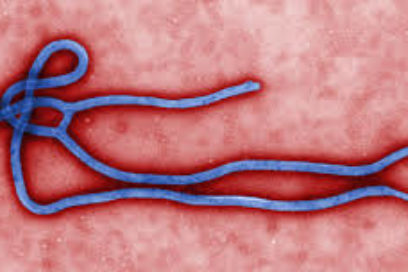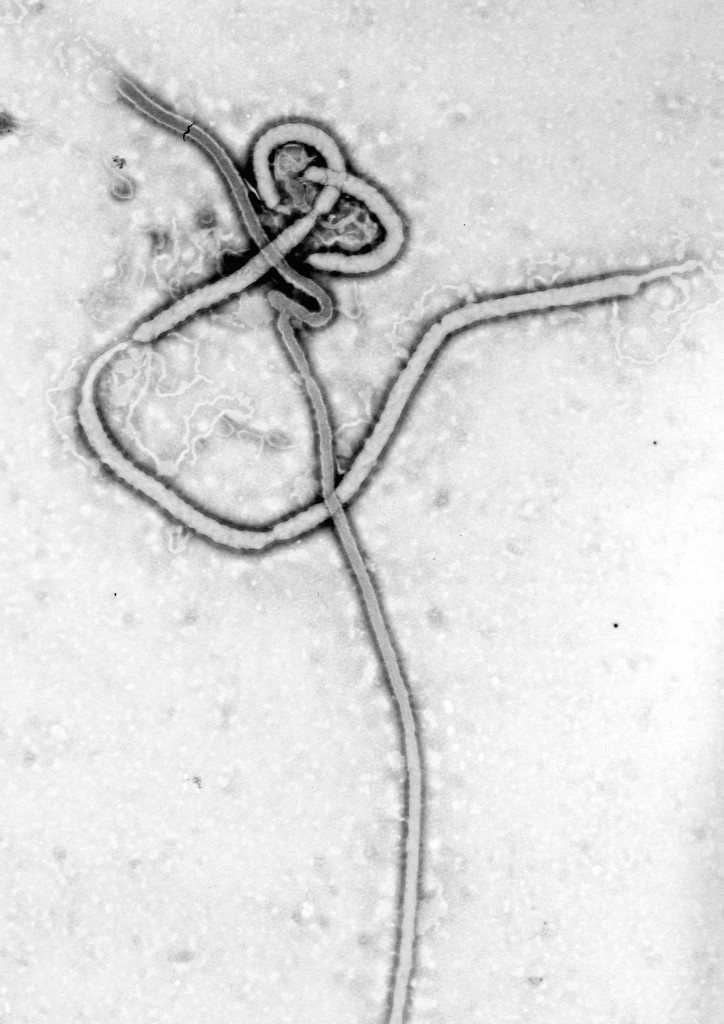1. What is the illness caused by Ebola virus?
The illness caused by Ebola virus (named before as Ebola bleeding fiver)is a serious illness and with lethal consequences whose rate of mortality reaches the 90 percent of the patients. This disease affects persons and primates no human (monkeys, gorillas and chimpanzees).
It was first detected in 1976 in two simultaneous outbreaks, one near the village near Ebola River, in the Republic of Congo and the other one in a remote zone from Sudan. The Ebola virus’ origin is unknown, but available scientific trials say bats (from Pteropodidae family) are the most probable hosts.
2. How do people get infected with the virus?
Ebola virus is introduced in the human population by close contact with organs, blood, secretions or other corporal liquids of the animals infected. In Africa there have been cases of infections associated top the manipulations of chimpanzees, gorillas, bats, monkeys, antelopes and porcupines found dead or sick in the wood. It is important to reduce contact with animals with high risk and neither touch these dead animals that could be found in the wood, nor manipulate their raw meat.
Ebola virus could spread in communities from one person to another when getting in contact with an infected animal with the virus. The infection is caused by direct contact (thought the mucous membrane or open wounds on the skin) with the blood or other liquid or corporal secretions (excrement, urine, saliva, semen) from people infected. Infections can also be caused when open wounds or mucous membranes of a healthy person get in contact with environments contaminated by the infected liquids of a patient with Ebola virus, like cloths there are wearing or the dirty cloth in the bed they had used or needles used in these patients.
Health staff is frequently exposed to the virus while giving assistance to these sick patients. There is risk if they do not wear personal protection equipment, like gloves while giving assistance to the patients. Suppliers to sanitary assistance at all levels from the health system “hospitals, dispensaries and health centers” should receive information on the characteristics of the disease and its transmission, and take serious precautions recommended for the control of the infection.
Burials where people have direct contact with the corpse could also be a way of transmission of Ebola virus. People should wear gloves and protection clothes resistance to manipulate people with who died of this disease, who should immediately be buried.
There are possibilities to get infected while the virus is present in blood and secretions. That is why; professional doctors should closely observe infected patients and made them lab trials to verify the virus is not in the organism before returning home. When the medical staff decides patients can return home it because they are not infected anymore and they cannot spread the virus in their communities. Men can keep on transmitting the virus by the semen to the couple even seven weeks after they clinically recover. So, it is important not to have sexual relations for at least seven weeks or use the condom in case they have sex before the seven weeks had passed.
3. Who run the greatest risk?
During the outbreak, those running the greatest risk for infection are:
– The sanitary staff
– Relatives or other people that had been in close contact with infected people
– the members of the procession with direct contact with the body of the dead people as part of the ceremony of burial
– Hunters that had had contact with dead animals found in the Wood.
It is necessary to keep on investigating to understand if some groups like the immune-depressed people or suffering underlying diseases are more sensitive than others to catch the disease. Virus’ exposition can be controlled by the use of protection measures in the dispensaries and hospitals, in communitarian meetings or at home.
4. Which are the signs and typical symptoms of the infection?
Infection manifests with the appearance of sudden fever, intense weakness, muscles pain, headache and sore throat. They are symptoms followed by vomits and diarrhea, skin rash, renal and hepatic dysfunction and in some cases, internal and external bleedings.
The results of the lad tests show decrease of the number of leucocytes and platelets, as well as an increase of the hepatic enzymes.
The incubation period (an interval from the infection to the appearance of the symptoms) is between 2 and 21 days. Patients are contagious since the moment they manifest the symptoms. They are not contagious during incubation.
Infections caused by Ebola virus can only be confirmed by lab tests.
5. When should you ask for medical assistance?
Someone who had been in a zone with confirmed cases of the disease by Ebola virus or in contact with an alleged infected people or whose infection has been confirmed should immediately look for medical assistance.
All alleged sick people should be reported as soon as possible to the nearest health center. Early medical assistance is essential to improve the survival rate of the disease.
It is also important stop the spreading of the illness, so, it is necessary to immediately start the control procedures of the infection.
6. What is the treatment?
Serious cases require intensive care assistance. Those patients tend to become dehydrated and they need intravenous serums or oral hydration with solutions having electrolytes. At present there is no specific treatment that could cure this disease.
Some patients recover with the adequate medical assistance.
To contribute in stopping the spreading of the virus, the alleged cases or those confirmed should be isolated from other patients and be treated by health staff that apply strict precautions to control the infection.
7. What can I do? Can I prevent the illness?
At present there is no authorized vaccine against Ebola virus. There are several vaccines in trail phase, but in this moment none of them are available for clinical use.
The only way to reduce contamination and death is spreading the information on the factor with greater risks and the protection measures that can be taken.
Ways to avoid the infection:
– Understand the characteristics of the disease, how it is transmitted and prevent its spreading
– Reduce contact with animals with high risk to be infected, that is to say, bats, monkeys or apes) in the woods affected.
– Product with animal origin (blood and meat) should be well cooked before consumption.
– When giving assistance to sick people, you should wear gloves and protection clothes.
– It is recommended to wash your hands regularly after visiting patients in a hospital or taking care of sick people at home.
– People who had dies as consequence of this disease should be manipulated using protection clothes resistance and be buried immediately.
8. And the health staff? How are they protected from the high risk they run taking care of these patients?
The health staff taking care of these patients with alleged or confirmed infection runs the greatest risks compared to other groups.
Besides the general precautions in the medical assistance, the health staff should rigorously apply
The recommended measures to control the infection with the purpose to prevent the exposition in blood or liquids or environment and objects infected, like dirty bed clothes of a patient or the needles used.
– They should use personal protection equipment, like white coats, gloves, protectors and glasses, or protection masks, all of individual use.
– They should not reutilize the equipment or the clothes for protection, unless they have been properly sterilized.
– They should change gloves from one alleged infected patient by Ebola virus to another.
– Invading procedures that could expose doctors, nurses and other people to be infected should be carries out with strict security conditions.
– Patients infected should be separated from other patients and healthy people, as possible.
9.
What about rumors that some food can prevent or cure the infection?
The WHO recommends asking for credible health advice on the disease by Ebola virus to the public health authorities. Although there is no specific drug against Ebola virus, the best treatment is the intensive cares given by the hospital by the health staff using rigorous procedures of the infection control, like the protection measures recommended.
10. How does the WHO protect health during the outbreaks?
The WHO facilitates technical advice to the countries and communities so they are prepared for the outbreaks of Ebola virus and respond to them.
Among the measures taken by WHO there are:
– Checking exchange of information between the regions to be alert on possible outbreaks.
– Giving technical assistance in the investigation and stopping threats for health when they take place, for instance, aids in situ to detect sick people and monitoring the characteristics of morbidity.
– Advice on prevention and treatment options.
– Deployment of experts and distribution of sanitary supplies (like personal protection equipment for health staff) when the country asks for it.
– Communications to inform the characteristics of the disease and the sanitary measures for protection to control the transmission of the virus.
– Activating regional and world nets of experts that will give aids, in case they ask for, to mitigate the possible international sanitary recoveries and the disruptions on trips and commerce.
11. In the outbreak, can the number of cases notified by the officials increase or decrease? Why?
In an outbreak of Ebola virus public health authorities in the country affected, they inform on the number of cases and deaths caused by the disease. The figures change every day and they reflect the suspicious and confirmed cases in the lab. Sometimes the numbers of suspicious and confirmed cases are informed at the same time, others are said separately.
That is why, data can vary. Analyzing tendencies of the data all along time, and have the additional information, is in general the most useful thing to evaluate the public health situation and give the adequate answer.
12. Is it safe to travel during an outbreak?
During an outbreak, the WHO periodically studies the public health situation and recommends restrictions to travel or commerce if necessary. The risk of infection for travelers is very poor because transmission from people to people is due to the direct contact with the liquids and corporal secretions from an infected patient.
General recommendations to travelers:
– Travelers should avoid all contact with infected patients.
– The health staff traveling to affected zones should comply the regulations on the control of the infection recommended by WHO.
– People who have visited zones with cases recently notified should know the symptoms of the infection and ask for medical assistance when appearing the first sign of the disease.
– We recommend all clinical doctors assisting travelers who had returned from affected zones and that have compatible symptoms, to consider the possibility of the disease of Ebola virus.
– Taken from WHO / EPP



